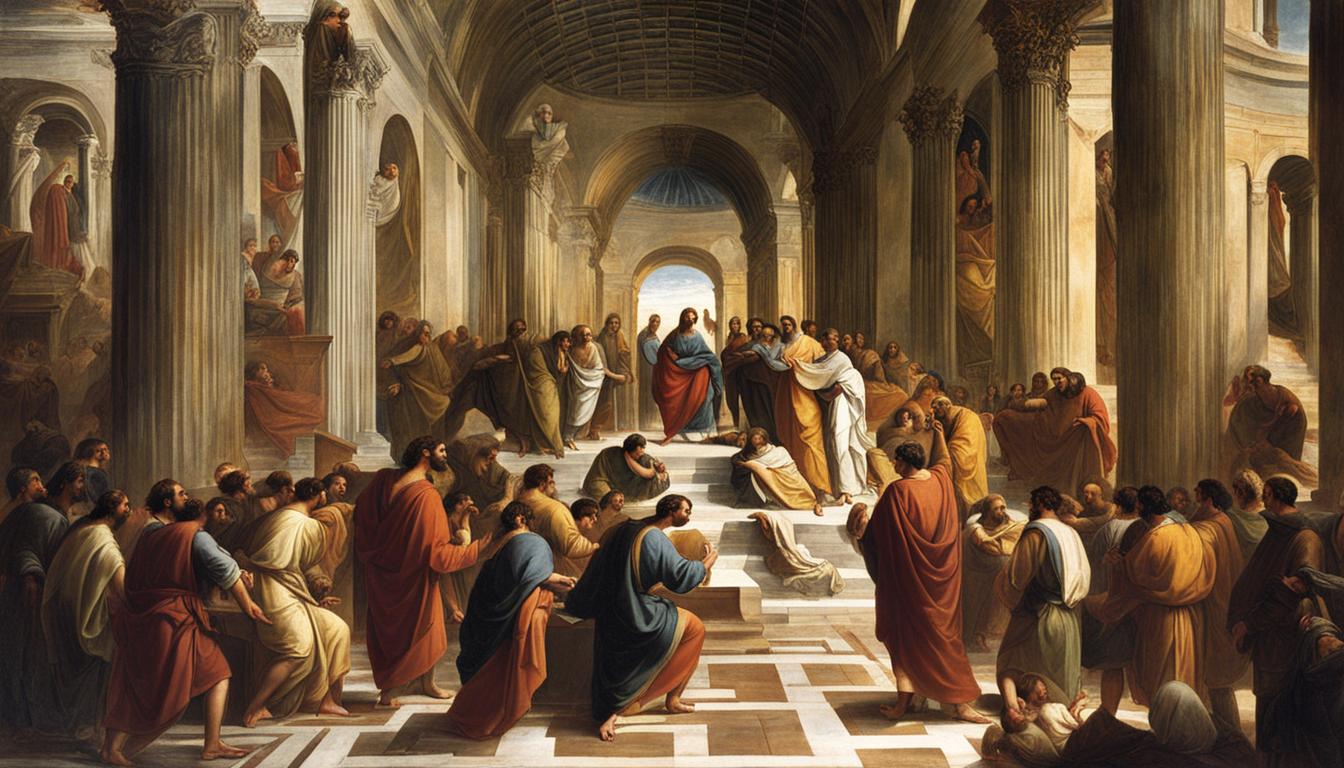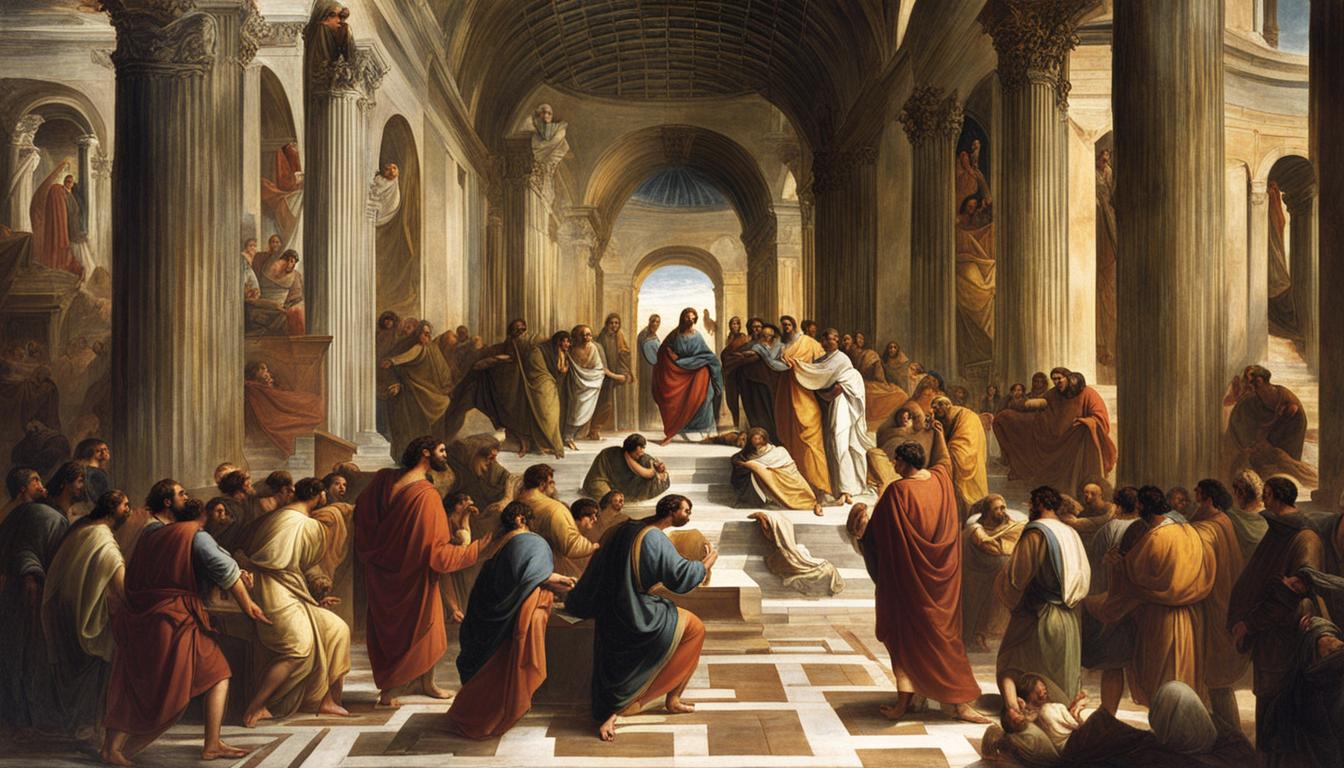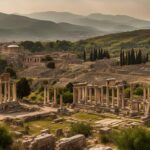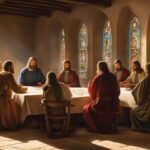The Thessalonian Church, an early Christian church in Thessaloniki, holds a significant place in the history of Christianity. Established in 51 AD during Apostle Paul’s second missionary journey, it grew and faced numerous challenges, making a lasting impact on faith and Christian teachings.
Thessalonica, a wealthy cosmopolitan city in Macedonia, provided the backdrop for the rapid growth of the Thessalonian Church. Despite persecution from both Jews and Gentiles, the believers thrived, becoming a model for other churches in their endurance and commitment to Paul’s teachings.
The Thessalonian Church’s historical significance lies in its contribution to the spread of Christianity in Europe. As one of the first Christian communities on the continent, it played a vital role in the development of Christian doctrine and theology.
Key Takeaways:
- The Thessalonian Church, founded by Apostle Paul in 51 AD, had a rich history in Thessaloniki.
- Despite facing persecution, the church experienced rapid growth and became a model for other churches.
- The Thessalonian Church played a crucial role in the early spread of Christianity in Europe.
- No significant denominational splits or schisms were recorded within the Thessalonian Church.
- The church was led by qualified elders and held regular communal worship practices.
The Thessalonian Church continues to inspire and impact believers worldwide with its historical significance and teachings. Today, its rich history serves as a valuable resource for understanding early Christian practices and beliefs.
Origins and Founders of the Thessalonian Church
The Thessalonian Church traces its origins to the Apostle Paul and his missionary journey. In 51 AD, Paul arrived in Thessalonica, a prosperous city in Macedonia, and began preaching the gospel in the synagogue. His teachings attracted both Jews and Gentiles, leading to the establishment of the Thessalonian Church. Paul’s influence was significant, as he laid the foundation of the church and shaped its early beliefs and practices.
Paul’s visit to Thessalonica marked the beginning of a vibrant Christian community that would play a crucial role in spreading the message of Christianity throughout the region. The Thessalonian Church became an example of faith and endurance, even in the face of persecution. It was through the work of Paul and the early believers that the Thessalonian Church gained its prominent position in the history of Christianity.
As the founder of the Thessalonian Church, the Apostle Paul’s teachings continue to shape the faith of believers today. His letters to the Thessalonians, preserved in the New Testament, provide valuable insights into the early development of Christian theology and doctrine. The Thessalonian Church stands as a testament to the enduring impact of Paul’s ministry and the transformative power of the gospel.
Table: Key Figures in the Founding of the Thessalonian Church
| Figure | Role |
|---|---|
| Apostle Paul | Founder and primary teacher of the Thessalonian Church |
| Thessalonian Jews and Gentiles | Early believers who embraced Paul’s message |
Key Beliefs and Doctrines of the Thessalonian Church
The Thessalonian Church holds firmly to a set of key beliefs and doctrines that form the foundation of their faith. These beliefs are rooted in the teachings of the Apostle Paul and the early Christian community. The Thessalonian believers affirm the deity of Jesus Christ, acknowledging Him as the Son of God and the Savior of the world. They believe that salvation is through faith in Christ alone, emphasizing the importance of a personal relationship with Him.
One of the central teachings of the Thessalonian Church is the hope of Christ’s return. They eagerly anticipate the second coming of Jesus and the resurrection of the dead. This belief provides them with comfort and encouragement in the face of trials and persecution. The Thessalonian believers also hold to the belief in the final judgment, where all people will be held accountable for their actions.
The Thessalonian Church places great importance on living a holy and righteous life. They strive to follow the example of Jesus and pursue a life characterized by love for God and one another. The Thessalonian believers understand that faith without works is dead and therefore actively engage in acts of service and compassion towards others. Their commitment to living out their faith is a testament to the transformative power of the gospel.
Table: Comparison of Key Beliefs and Doctrines
| Belief | Thessalonian Church | Christianity as a Whole |
|---|---|---|
| Deity of Jesus Christ | Believe in the deity of Jesus Christ | Believe in the deity of Jesus Christ |
| Salvation | Salvation through faith in Christ alone | Salvation through faith in Christ alone |
| Hope of Christ’s Return | Await the second coming of Jesus | Await the second coming of Jesus |
| Resurrection and Final Judgment | Believe in the resurrection of the dead and final judgment | Believe in the resurrection of the dead and final judgment |
| Holy and Righteous Living | Emphasize living a holy and righteous life | Emphasize living a holy and righteous life |
The key beliefs and doctrines of the Thessalonian Church are not only central to their faith but also contribute to the overall Christian theology. Their unwavering commitment to these beliefs has a profound impact on their daily lives and serves as a testimony to the enduring power of the gospel message.
Historical Significance of the Thessalonian Church
The Thessalonian Church holds great historical significance in the early spread of Christianity. It was one of the first Christian communities established in Europe and played a crucial role in the spread of the gospel throughout the region. The Thessalonian believers served as a model for other churches, showcasing their endurance in the face of persecution and their commitment to the teachings of Paul.
Throughout its history, the Thessalonian Church faced opposition from both Jews and Gentiles, who sought to suppress the growth of this new faith. Despite the challenges, the Thessalonian believers remained steadfast, and their perseverance became a testament to the power and resilience of their faith. Their unwavering commitment to their beliefs and their unwavering commitment to their fellow believers made a lasting impact on the early Christian community.
“The Thessalonian Church was an inspiration to other Christian communities. Their faith and dedication in the face of persecution demonstrated the transformative power of the gospel. Their influence spread far beyond their city, shaping the growth and development of Christianity in the region.”
The significance of the Thessalonian Church is not confined to the early years of Christianity. The epistles written by the Apostle Paul to the Thessalonians provide valuable insights into the early development of Christian theology and doctrine. These letters offer guidance and encouragement to the Thessalonian believers and continue to be a source of inspiration for Christians today.
| Key Points | Impact |
|---|---|
| One of the first Christian communities in Europe | Contributed to the spread of Christianity throughout the region |
| Endured persecution and remained steadfast in their faith | Inspired other Christian communities and shaped the growth of Christianity |
| Epistles written by Paul offer valuable insights into early Christian theology | Continue to be a source of inspiration for Christians today |
Denominational Split or Schisms in the Thessalonian Church
Throughout its history, the Thessalonian Church remained remarkably united, with no significant record of denominational split or schisms. Despite facing persecution and challenges, the early believers in Thessalonica embraced a strong sense of unity and remained committed to their shared faith.
The absence of denominational divisions within the Thessalonian Church can be attributed to several factors. Firstly, the teachings and influence of the Apostle Paul played a crucial role in maintaining the unity of the church. Paul’s teachings emphasized the importance of love, unity, and mutual submission among believers, creating a strong foundation for the Thessalonian Church to thrive.
Secondly, the Thessalonian Church benefited from the guidance and governance of qualified leaders known as elders or overseers. These leaders provided spiritual direction and ensured the adherence to sound doctrine, helping to prevent the emergence of divisive factions within the church.
Finally, the Thessalonian believers’ shared experiences of persecution and hardship fostered a sense of solidarity and mutual support. The church faced opposition from both Jews and Gentiles, but this external pressure served to strengthen their bonds and commitment to one another.
The unity and lack of denominational split in the Thessalonian Church is a testament to the resilience and commitment of its early believers. Their example serves as an inspiration to Christians today, emphasizing the importance of unity, love, and mutual support in the face of challenges.
Leadership and Governance of the Thessalonian Church
The Thessalonian Church, like many early Christian communities, operated under a system of qualified leaders known as elders or overseers. These leaders were responsible for providing spiritual guidance and shepherding the church. The Apostle Paul played a significant role in the leadership of the Thessalonian Church, offering ongoing support and guidance through his letters and visits.
The elders in the Thessalonian Church were chosen based on their spiritual maturity, wisdom, and ability to teach and guide others. They were entrusted with the responsibility of maintaining order and unity within the community of believers. The elders provided pastoral care, resolved conflicts, and ensured that the teachings of Paul and the apostles were faithfully upheld.
This system of leadership and governance fostered a structured and orderly community within the Thessalonian Church. It allowed for the spiritual growth and development of believers, as well as the efficient functioning of the church as a whole. The involvement of qualified leaders ensured that the Thessalonian Church remained rooted in sound doctrine and continued to thrive despite external challenges.
| Roles of Leaders in the Thessalonian Church | Responsibilities |
|---|---|
| Elders/Overseers | Provided spiritual guidance and shepherding |
| Apostle Paul | Offered ongoing support and guidance through letters and visits |
| Elders | Chosen based on spiritual maturity, wisdom, teaching ability |
| Elders | Maintained order, resolved conflicts, upheld teachings |
“Remember your leaders, those who spoke to you the word of God. Consider the outcome of their way of life, and imitate their faith.” – Hebrews 13:7
The leadership and governance structure of the Thessalonian Church served as a model for other Christian communities and played a crucial role in its growth and perseverance. The elders provided the necessary guidance and oversight to ensure the spiritual health and stability of the Thessalonian believers, allowing them to flourish and impact others with their faith.
Worship Practices in the Thessalonian Church
The Thessalonian Church had a rich tradition of worship practices that played a central role in their communal gatherings. These practices were rooted in early Christian worship and followed a pattern that included various elements aimed at fostering spiritual growth and unity among believers.
Prayer and Singing:
One of the key aspects of worship in the Thessalonian Church was the emphasis on prayer and singing. Believers would come together to pray collectively, seeking guidance, expressing gratitude, and interceding for one another. Singing was also an integral part of their worship, with hymns and spiritual songs being sung to glorify God and uplift the hearts of the worshippers.
Reading of Scripture and Teaching:
The Thessalonian Church placed great importance on the reading and study of Scripture. During their gatherings, selected portions of the Old Testament and the letters of the apostles, including Paul’s writings, were read aloud. This was followed by teaching sessions where the leaders would expound on the Word of God, providing explanations, insights, and practical applications for the believers.
The Lord’s Supper and Baptism:
The Thessalonian Church regularly observed the Lord’s Supper, also known as communion. This practice involved partaking of bread and wine, symbolizing the body and blood of Christ, in remembrance of His sacrifice. Baptism was also an important rite in the Thessalonian Church, representing the believer’s identification with Christ’s death, burial, and resurrection.
| Worship Practices in the Thessalonian Church | Description |
|---|---|
| Prayer and Singing | The Thessalonian Church emphasized collective prayer and singing during worship. They sought communion with God through prayer and praised Him through songs and hymns. |
| Reading of Scripture and Teaching | Scripture played a vital role in the Thessalonian Church. The believers would read and study the Word of God, and their leaders would provide teachings based on the Scriptures. |
| The Lord’s Supper and Baptism | The Thessalonian Church observed the Lord’s Supper, symbolizing Christ’s sacrifice, and participated in baptism as a sign of their faith in Him. |
The worship practices of the Thessalonian Church fostered a sense of unity, reverence, and spiritual growth among the believers. Through prayer, singing, the study of Scripture, and the participation in sacraments, the Thessalonians expressed their devotion to God and strengthened their bond as a Christian community.
Contemporary Influence of the Thessalonian Church
The Thessalonian Church, with its rich history and enduring faith, continues to have a profound influence on contemporary Christianity. The teachings of the Apostle Paul to the Thessalonians, captured in his epistles, serve as valuable resources for understanding early Christian theology and the practical application of faith in today’s world. The Thessalonian believers’ example of endurance in the face of persecution and their commitment to the teachings of Paul continue to inspire and challenge Christians worldwide.
The Impact on Doctrinal Development
The Thessalonian Church played a significant role in shaping early Christian doctrine. Paul addressed various theological concepts and eschatological beliefs in his letters to the Thessalonians. Their emphasis on the hope of Christ’s return, the resurrection of the dead, and the final judgment influenced subsequent generations of believers and helped solidify these teachings as essential tenets of the Christian faith. Today, the Thessalonian Church’s influence can be seen in the widespread acceptance and adherence to these core Christian beliefs.
“We always thank God for all of you and continually mention you in our prayers. We remember before our God and Father your work produced by faith, your labor prompted by love, and your endurance inspired by hope in our Lord Jesus Christ.” – 1 Thessalonians 1:2-3
Inspiration for Perseverance
The Thessalonian Church serves as a beacon of inspiration for Christians facing various challenges and adversities today. Despite enduring persecution and opposition, the Thessalonian believers remained steadfast in their faith and commitment to the teachings of Paul. Their resilience and unwavering devotion to Christ’s message inspire contemporary believers to stand firm in their convictions and continue spreading the gospel even in the face of opposition.
Moreover, the Thessalonian Church’s example of unity and love for one another serves as a reminder of the importance of Christian fellowship and mutual encouragement. In a fragmented and divided world, the Thessalonian Church’s model of unity and love continues to inspire Christians to embrace these virtues and build strong, supportive communities of faith.
| Aspect of Influence | Impact |
|---|---|
| Doctrinal Development | Shaped early Christian theology and eschatological beliefs |
| Inspiration for Perseverance | Encourages believers to stand firm in their faith in the face of adversity |
| Model of Unity and Love | Inspires Christians to prioritize fellowship and mutual encouragement |
Current World Membership Number and Percentage of World Religions
The Thessalonian Church, as part of the broader Christian faith, has contributed to the global membership number of Christianity. While exact data regarding the current world membership number of the Thessalonian Church is unavailable, Christianity itself has more than 2.5 billion adherents worldwide, making it the largest religion in the world. The Thessalonian Church represents a significant percentage of this Christian population.
| Religion | World Membership Number | Percentage |
|---|---|---|
| Christianity | 2.5 billion+ | Approximately 33.2% |
| Islam | 1.9 billion+ | Approximately 24.9% |
| Hinduism | 1.2 billion+ | Approximately 15.9% |
| Buddhism | 535 million+ | Approximately 7.1% |
| Sikhism | 27 million+ | Approximately 0.4% |
These figures provide a glimpse into the global religious landscape and highlight the prominence of Christianity as the most widely followed religion. While the Thessalonian Church’s specific membership number is not available, the broader Christian faith continues to have a significant presence worldwide, with billions of believers spread across various denominations and traditions.
It is important to note that these figures are approximate and subject to change, as religious demographics continue to evolve over time. However, they serve as a representation of the significant number of individuals who identify with Christianity and the enduring impact of the Thessalonian Church and its teachings.
Conclusion
The rich history of the Thessalonian Church traces its origins to the Apostle Paul and the early Christian community. The church played a vital role in the spread of Christianity and the development of Christian theology. Despite facing persecution and challenges, the Thessalonian believers remained steadfast in their faith and served as a model for other churches.
Today, the Thessalonian Church continues to inspire and impact believers worldwide, with its teachings and example serving as valuable resources for understanding early Christian practices and beliefs. The Thessalonian Church’s influence extends beyond its historical significance, as it continues to provide guidance and inspiration to Christians in the modern world.
As we reflect on the journey of the Thessalonian Church, we are reminded of the importance of faith, perseverance, and unity. The Thessalonian believers endured hardships and remained true to their beliefs, leaving behind a legacy that continues to shape the Christian faith today. Through their example, we are encouraged to have the same unwavering commitment to our faith and to continue spreading the message of love, hope, and salvation.
FAQ
When was the Thessalonian Church established?
The Thessalonian Church was established in 51 AD during Paul’s second missionary journey.
Where was the Thessalonian Church located?
The Thessalonian Church was located in the city of Thessalonica, which is modern-day Salonika.
Did the Thessalonian Church face persecution?
Yes, the Thessalonian Church faced persecution from both Jews and Gentiles.
How did the Thessalonian Church grow despite the challenges?
The Thessalonian Church grew rapidly due to the response of many Jews and Gentiles to Paul’s message.
What role did the Thessalonian Church play in the early spread of Christianity?
The Thessalonian Church played a significant role in the early spread of Christianity and the development of Christian doctrine.
Was there any denominational split in the Thessalonian Church?
No, there is no record of any significant denominational split or schisms within the Thessalonian Church.
Who were the leaders of the Thessalonian Church?
The Thessalonian Church was led by a group of qualified leaders known as elders or overseers.
What were the worship practices of the Thessalonian Church?
The worship practices of the Thessalonian Church included prayers, singing, reading of Scripture, teaching of the apostles’ doctrine, the Lord’s Supper, and baptism.
Does the Thessalonian Church still have an influence today?
Yes, the Thessalonian Church continues to have a significant influence on faith and Christian teachings today.
What is the current world membership number of the Thessalonian Church?
The exact data regarding the current world membership number of the Thessalonian Church is unavailable, but it is estimated to be a significant portion of the global Christian population, which has more than 2.5 billion adherents.
















